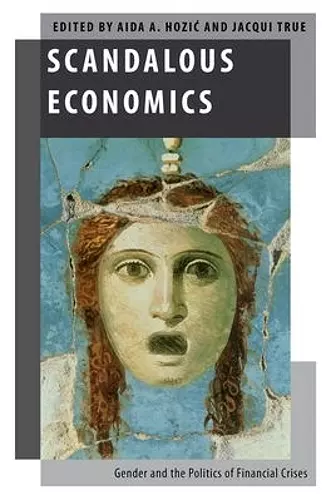Scandalous Economics
Gender and the Politics of Financial Crises
Jacqui True editor Aida A Hozić editor
Format:Hardback
Publisher:Oxford University Press Inc
Published:21st Apr '16
Currently unavailable, and unfortunately no date known when it will be back
This hardback is available in another edition too:
- Paperback£48.49(9780190204242)

Of all of the lies, fragile alliances, and predatory financial dealings that have been revealed in the wake of the Global Financial Crisis of 2008, we have yet to come to terms with the ways in which structural inequalities around gender and race factor into (and indeed make possible) the current economic order. Scandalous Economics is about "silences" - the astonishing neglect of gender and race in explanations of the Global Financial Crisis. But, it is also about "noises" - the sexual scandals and gendered austerity policies that have relegated public debate, and the crisis itself, into political oblivion. While feminist economists and movements such as Occupy Wall Street have pointed to the distributional inequalities that are an effect of financial deregulation, scholars haven't really grappled with the representational inequalities inherent in the way we view the politics of the market. For example, capitalism won't be made more equitable simply by appointing women to leadership positions within financial firms or corporations. And the next crisis will not be averted if our understandings of gendered inequalities are framed by sexual scandals in media and popular culture. We need to look at the activities and the privileges of the advantaged - the "TED women" of the crisis -- as much as the victimization of the disadvantaged - to fully grasp the interplay between gender and economy in this fragile age of restoration. Scandalous Economics breaks new ground by doing precisely this. It argues that normalization of the post-GFC economic order in the face of its obvious breakdown(s) has been facilitated by co-optation of feminist and queer perspectives into national and international responses to the crisis. Scandalous Economics builds upon the Occupy movement and other critical analysis of the GFC to comprehensively examine gendered material, ideational and representational dimensions that have served to make the crisis and its effects, 'the new normal' in Europe and America as well as Latin America and Asia.
This innovative collection wonderfully illustrates the power of radical feminist theorizing in disclosing the gendered roots, genesis, dynamics, narration, governance and impact of financial crisis and insecurity. Written by established and rising feminist scholars, it roundly rejects the idea that gender is an optional add-on and demonstrates its foundational role in the production and reproduction of exploitation, structured inequalities of power, and the dynamics of neoliberalism. Drawing on diverse methods, highlighting the intersectionality of inequalities, and focusing on different aspects of the financial crisis and related insecurities, they reveal many obscure features of financialization for the scandal that they are and also show how gendered representations of crisis subtly shape the brutal and unequal management of crisis. This is a must for the classroom, the library, and the activists bookshelf. * Bob Jessop, Lancaster University *
Reading this book eight years after the financial crash is sobering. True and Hozić's thoughtful authors are raising bright yellow warning banners that read: Do not imagine that the sorts of masculinized presumptions and structures that fueled the global banking and housing nightmares have been relegated to the attic. Their roots go down deeper than any scandal and still are alive and thriving. * Cynthia Enloe, author of Seriously!: Investigating Crashes and Crises as if Women Mattered *
Over the past decade, the global financial crisis has been forgotten. Crucial questions regarding subjects, bodies, and practices have been displaced by bloodless macroeconomic and theoretical abstractions, while critical voices and ethical concerns have been co-opted and reduced to matters of technique. This book shows over a series of path-breaking chapters how this great repression happened, demonstrating the need for gendered and feminist analyses which counter analytic amnesia and highlight the everyday realities of embodied practices and subjects. * Wesley Widmaier, Griffith University, Australia *
ISBN: 9780190204235
Dimensions: 162mm x 244mm x 29mm
Weight: 640g
352 pages